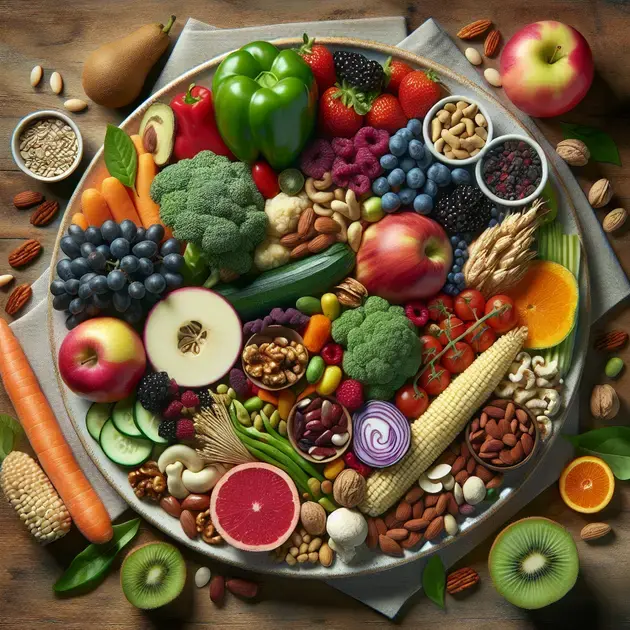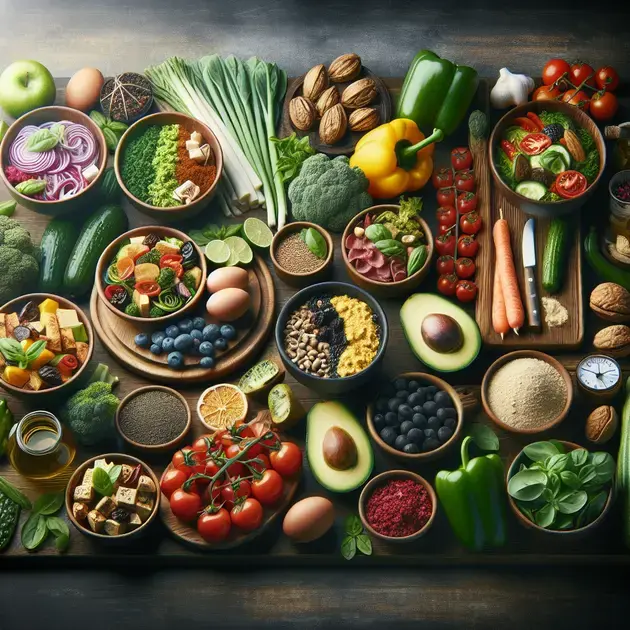When it comes to achieving effective weight loss, choosing the right diet plan is crucial. With an overwhelming number of options available, it can be challenging to determine which one will work best for you. In this article, we will explore the top 10 best diet plans that have been proven to deliver results.
From popular programs like the Mediterranean diet to innovative approaches like intermittent fasting, these diet plans offer a variety of strategies to help you reach your weight loss goals. Whether you’re looking to shed a few pounds or make a long-term lifestyle change, there is a diet plan on this list that can suit your needs.

Low-Carb Diets for Quick Results
Low-carb diets have been known for their effectiveness in achieving quick results when it comes to weight loss and overall health improvement. These diets focus on reducing the intake of carbohydrates, which leads the body to burn stored fat for energy instead of relying on glucose from carbs.
Step-by-Step Guide:
1. **Choose the Right Foods:** Start by including high-protein foods such as lean meats, fish, eggs, and tofu in your meals. Opt for non-starchy vegetables like leafy greens, broccoli, and cauliflower.
2. **Limit Carbohydrate Intake:** Reduce the consumption of grains, sugars, and processed foods. Focus on whole foods and natural sources of fats like avocados, nuts, and seeds.
3. **Stay Hydrated:** Drink plenty of water throughout the day to support digestion and metabolism. Hydration is key to flushing out toxins and aiding in weight loss.
4. **Track Your Progress:** Use apps like MyFitnessPal or Carb Manager to monitor your daily carb intake and track your meals. These apps provide valuable insights and help you stay on track.
5. **Include Regular Exercise:** Incorporate a mix of cardio and strength training exercises to boost fat burning and improve overall fitness levels.
By following a low-carb diet and incorporating these steps into your daily routine, you can experience quick results in terms of weight loss, increased energy levels, and overall wellbeing.
Intermittent Fasting: A Sustainable Approach
Intermittent fasting has gained popularity as a sustainable approach to weight management and overall health. This dietary pattern involves cycling between periods of eating and fasting, which can lead to numerous health benefits, including weight loss, improved metabolism, and better blood sugar control.
Step-by-Step Guide:
1. **Choose Your Fasting Method:** There are various ways to practice intermittent fasting, such as the 16/8 method or alternate-day fasting. Select a method that aligns with your lifestyle and preferences.
2. **Plan Your Meals:** During eating windows, focus on nutrient-dense foods like fruits, vegetables, whole grains, and lean proteins. Avoid excessive processed foods and sugars.
3. **Stay Consistent:** Establish a routine and stick to your fasting schedule. Consistency is key to reaping the full benefits of intermittent fasting.
4. **Monitor Your Progress:** Use apps like Zero or FastHabit to track your fasting hours and meal times. These tools can help you stay accountable and track your results.
5. **Listen to Your Body:** Pay attention to how your body responds to fasting and make adjustments as needed. Stay hydrated and nourished during eating windows.
By adopting intermittent fasting as a sustainable approach to your dietary habits, you can achieve lasting results in terms of weight management, improved metabolic health, and overall well-being.
Plant-Based Diets for Holistic Wellness
Plant-based diets have long been associated with holistic wellness, offering a wide range of health benefits for both the body and the environment. By focusing on whole, plant-based foods and reducing or eliminating animal products, individuals can experience improved digestion, increased energy levels, and reduced risk of chronic diseases.
Step-by-Step Guide:
1. **Embrace Whole Foods:** Fill your plate with a variety of fruits, vegetables, whole grains, legumes, nuts, and seeds. These nutrient-dense foods provide essential vitamins, minerals, and antioxidants.
2. **Experiment with Plant-Based Proteins:** Incorporate sources of plant-based protein like beans, lentils, tofu, and quinoa into your meals. These options are rich in protein and fiber, promoting satiety and muscle health.
3. **Focus on Diversity:** Explore different flavors and cuisines to make your plant-based meals exciting and satisfying. Incorporate herbs, spices, and seasonings for added taste.
4. **Educate Yourself:** Learn about the environmental and health benefits of plant-based eating through resources like the Forks Over Knives website or the HappyCow app, which helps you locate plant-based restaurants near you.
5. **Meal Prep and Planning:** Prepare plant-based meals in advance to ensure you have nutritious options readily available. Batch cooking and prepping ingredients can save time and support your wellness goals.
By transitioning to a plant-based diet and following these steps, you can promote holistic wellness, support sustainability, and enhance your overall health and vitality.

**Ketogenic Diet for Fast Fat Burning**
The Benefits of Ketogenic Diet
A ketogenic diet is a high-fat, adequate-protein, low-carbohydrate diet that has been shown to be effective for fast fat burning. By drastically reducing your carb intake and replacing it with fat, your body enters a state of ketosis where it burns fat for fuel instead of glucose. This process is known to promote rapid weight loss, especially in the form of fat loss around the abdominal area.
Incorporating Healthy Fats
One of the key principles of the ketogenic diet is to consume healthy fats such as avocados, nuts, seeds, and olive oil. These fats not only help you feel satiated and satisfied but also provide essential nutrients for overall health. Additionally, healthy fats play a crucial role in supporting your body’s transition into ketosis and maximizing fat burning.
The Importance of Protein Intake
While the focus of the ketogenic diet is on fats, it is also important to maintain an adequate protein intake. Protein is essential for muscle maintenance and repair, especially during weight loss. Including sources of high-quality protein like fish, poultry, and tofu can help preserve lean muscle mass and support your weight loss goals.
Staying Hydrated and Nourished
Proper hydration is key when following a ketogenic diet, as your body tends to excrete more water and electrolytes. Drinking plenty of water and incorporating electrolyte-rich foods like leafy greens and bone broth can help prevent dehydration and maintain optimal body function. It is also important to ensure you are getting a variety of nutrients from low-carb vegetables and supplements if needed.
Maintaining Consistency and Monitoring Progress
Consistency is paramount when it comes to the ketogenic diet. Keeping track of your daily macros and adjusting your meals as needed can help you stay on track and achieve fast fat burning results. Regularly monitoring your progress through measurements, body fat percentage, and energy levels can also provide valuable insights into the effectiveness of your ketogenic diet plan.
Delicious Recipes for Ketogenic Diet
Following a ketogenic diet doesn’t mean sacrificing flavor. There are plenty of delicious recipes that are both satisfying and in line with the principles of the diet. From creamy avocado salads to savory cauliflower rice bowls, you can enjoy a wide variety of meals while promoting fast fat burning. Experimenting with different ingredients and cooking methods can help keep your ketogenic diet exciting and sustainable in the long run.
Meal Prep Tips for Success
Meal prepping is a great way to stay consistent with your ketogenic diet and avoid unhealthy food choices. Spending time planning and preparing your meals ahead of time can save you time and ensure you have nutritious options readily available. Consider batch cooking protein sources, cutting up vegetables for quick snacks, and portioning out fats like nuts and seeds for easy grab-and-go options throughout the week.
Snack Ideas to Stay Satisfied
When following a ketogenic diet, having satisfying snacks on hand is essential to prevent cravings and maintain energy levels. Opt for snacks that are high in healthy fats and protein, such as cheese and nut platters, hard-boiled eggs, or Greek yogurt with berries. These options not only taste delicious but also provide the nutrients your body needs to support fast fat burning and overall well-being.
Indulgent Desserts Without the Guilt
Who says you can’t enjoy desserts on a ketogenic diet? With clever ingredient substitutions and creative recipes, you can satisfy your sweet tooth while staying on track with your weight loss goals. Treat yourself to rich dark chocolate avocado mousse, coconut flour cookies, or almond flour pancakes drizzled with sugar-free syrup. By incorporating these indulgent desserts in moderation, you can stick to your ketogenic diet without feeling deprived.
Meal Planning for Long-Term Success
Planning your meals in advance is key to long-term success on a ketogenic diet. Creating meal plans that include a balance of fats, proteins, and low-carb vegetables can help you stay on track and avoid last-minute temptations. Whether you prefer simple one-pan meals or adventurous recipes from around the world, having a clear plan in place can set you up for continued fat burning and weight loss success.
**
Conclusion
**
The Ketogenic Diet offers a powerful approach to fast fat burning by emphasizing high fat, adequate protein, and low carbohydrate intake, leading the body into a state of ketosis for efficient fat utilization. This dietary strategy not only promotes rapid weight loss, particularly targeting abdominal fat, but also highlights the significance of incorporating healthy fats like avocados, nuts, and olive oil. These fats not just enhance satisfaction but also provide essential nutrients crucial for overall health while facilitating the transition into ketosis.
Moreover, maintaining an adequate protein intake is essential for muscle preservation and repair during weight loss. Sources such as fish, poultry, and tofu play a key role in preserving lean muscle mass, aligning with the ketogenic principles. Alongside this, staying hydrated is vital due to increased water and electrolyte excretion; hence, integrating electrolyte-rich foods like leafy greens becomes crucial for optimal bodily functions and prevention of dehydration.
Consistency is fundamental in reaping the benefits of the Ketogenic Diet. Tracking daily macros, adjusting meals as needed, and monitoring progress through measurements and energy levels can provide valuable insights for effective fat burning results. When it comes to meal preparation, it offers a way to uphold consistency, avoid unhealthy choices, and ensure nutritious options are readily available, supporting long-term success on the ketogenic journey.